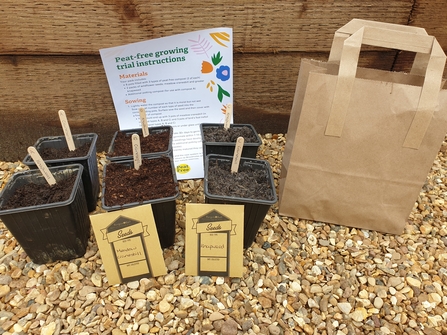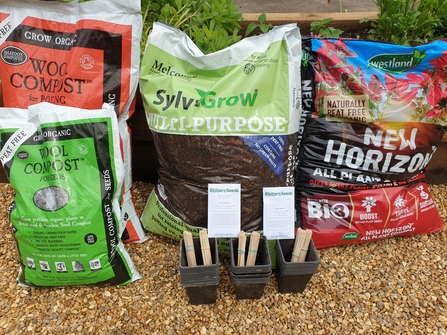Healthy peatlands are one of the most important natural resources in addressing our dual climate and nature emergencies. However, globally huge tracts of these amazing habitats are being drained, dug up and destroyed, simply to fill cheap bags of garden compost or grow the plants that you buy in your local garden centre.
Peat-free planting trial
Common knapweed and meadow cranesbill seedlings grown as part of our peat-free planting trial.
Little Woolden Moss during commercial peat extraction for use in the horticultural industry
It is clear that this damaging and unnecessary practice has to stop. The UK government has committed to a consultation on banning the use of peat in domestic horticulture by the end of 2024, but there is a simple step that we can all take now to start making a difference – go peat-free.
There is an ever-increasing range of peat-free composts on the market, but just how good they are? To answer this question, we enlisted a band of our wonderful Lancashire Wildlife Trust volunteers to undertake a peat-free growing trial.

Peat-free planting trail kits were provided to each of our volunteers
How did the trial work?
Each volunteer was provided with three different types of peat-free composts, labelled A, B and C, and a packet each of meadow cranesbill and common knapweed seeds. Compost type A had both a sowing mix and then a follow-on potting mix, whereas B and C were multipurpose varieties. The volunteers were then asked to plant both types of seeds separately in each type of compost and monitor the results.
The composts were kindly donated by Dalefoot Composts (type A), Sylvagrow (type B), and Barton Grange Garden Centre provided the New Horizon compost that was type C. The seeds were donated by Chiltern Seeds, and these native wildflower species were chosen as they typically grow in slightly different conditions. Meadow cranesbill prefers well drained conditions, whereas common knapweed can take it slightly wetter.

Results
It’s fair to say that we had a real mixed bag of results, with no one clear winner out of any of the compost types.
Most people found that the meadow cranesbill was the most difficult seed to germinate, with some seedlings only appearing a whopping three months after planting, if they appeared at all. However, the common knapweed was more successful with most seeds germinating between five and fourteen days after planting, but again one seedling only decided to show its face six weeks later!
Common knapweed and meadow cranesbill seedlings grown as part of our peat-free planting trial.
As this was not a fully scientifically controlled trial and our volunteers will have been storing their pots of compost and seedlings in varying conditions and with naturally different amounts of light and water, some variation in the results is to be expected.
The main take home message from the trial was that all of the different types of peat-free composts behaved very similarly and successfully grew and supported wildflowers from seed to young plant. It is worth remembering that before the 1950’s peat was rarely used in horticulture and people were still able to garden and grow wonderful plants, so there really is no excuse not to go peat-free today.
One of our volunteers, Lorna, helping to plant out the wildflowers plants from the peat-free growing trail at Lunt Meadows
What happened next?
The beautiful seedlings were then taken to our Lunt Meadows nature reserve where they were planted out into one of the meadow areas to boost species richness and provide lots of food for pollinators and other wildlife next summer.
Thank you so much to all of our volunteers and to Dalefoot Composts, Sylvagrow, Barton Grange Garden Centre and Chiltern Seeds for donating the materials for the trial.

